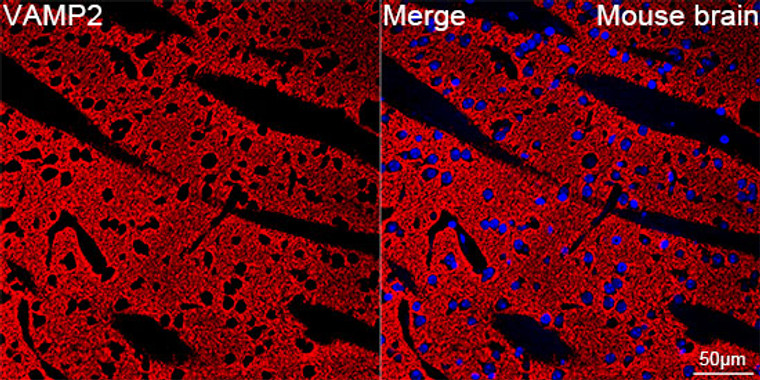| Host: | Rabbit |
| Applications: | WB/IF |
| Reactivity: | Human/Mouse/Rat |
| Note: | STRICTLY FOR FURTHER SCIENTIFIC RESEARCH USE ONLY (RUO). MUST NOT TO BE USED IN DIAGNOSTIC OR THERAPEUTIC APPLICATIONS. |
| Short Description: | Rabbit monoclonal antibody anti-VAMP2 (1-100) is suitable for use in Western Blot and Immunofluorescence research applications. |
| Clonality: | Monoclonal |
| Clone ID: | S4MR |
| Conjugation: | Unconjugated |
| Isotype: | IgG |
| Formulation: | PBS with 0.02% Sodium Azide, 0.05% BSA, 50% Glycerol, pH7.3. |
| Purification: | Affinity purification |
| Dilution Range: | WB 1:500-1:1000IF/ICC 1:50-1:200 |
| Storage Instruction: | Store at-20°C for up to 1 year from the date of receipt, and avoid repeat freeze-thaw cycles. |
| Gene Symbol: | VAMP2 |
| Gene ID: | 6844 |
| Uniprot ID: | VAMP2_HUMAN |
| Immunogen Region: | 1-100 |
| Immunogen: | A synthetic peptide corresponding to a sequence within amino acids 1-100 of human VAMP2 (P63027). |
| Immunogen Sequence: | MSATAATAPPAAPAGEGGPP APPPNLTSNRRLQQTQAQVD EVVDIMRVNVDKVLERDQKL SELDDRADALQAGASQFETS AAKLKRKYWWKNLKMMIILG |
| Tissue Specificity | Nervous system and skeletal muscle. |
| Post Translational Modifications | Phosphorylated by PRKCZ in vitro and this phosphorylation is increased in the presence of WDFY2. (Microbial infection) Targeted and hydrolyzed by C.botulinum neurotoxin type B (BoNT/B, botB) which hydrolyzes the 76-Gln-|-Phe-77 bond and probably inhibits neurotransmitter release. (Microbial infection) Targeted and hydrolyzed by C.botulinum neurotoxin type D (BoNT/D, botD) which probably hydrolyzes the 59-Lys-|-Leu-60 bond and inhibits neurotransmitter release. Note that humans are not known to be infected by C.botulinum type D. (Microbial infection) Targeted and hydrolyzed by C.botulinum neurotoxin type F (BoNT/F, botF) which hydrolyzes the 58-Gln-|-Lys-59 bond and probably inhibits neurotransmitter release. (Microbial infection) Targeted and hydrolyzed by C.tetani tetanus toxin (tetX) which hydrolyzes the 76-Gln-|-Phe-77 bond and probably inhibits neurotransmitter release. |
| Function | Involved in the targeting and/or fusion of transport vesicles to their target membrane. Major SNARE protein of synaptic vesicles which mediates fusion of synaptic vesicles to release neurotransmitters. Essential for fast vesicular exocytosis and activity-dependent neurotransmitter release as well as fast endocytosis that mediates rapid reuse of synaptic vesicles. Modulates the gating characteristics of the delayed rectifier voltage-dependent potassium channel KCNB1. |
| Protein Name | Vesicle-Associated Membrane Protein 2Vamp-2Synaptobrevin-2 |
| Database Links | Reactome: R-HSA-1445148Reactome: R-HSA-181429Reactome: R-HSA-181430Reactome: R-HSA-199992Reactome: R-HSA-210500Reactome: R-HSA-212676Reactome: R-HSA-264642Reactome: R-HSA-264876Reactome: R-HSA-422356Reactome: R-HSA-432720Reactome: R-HSA-432722Reactome: R-HSA-449836Reactome: R-HSA-5250955Reactome: R-HSA-5250958Reactome: R-HSA-5250981Reactome: R-HSA-5250982Reactome: R-HSA-5250989Reactome: R-HSA-8856825Reactome: R-HSA-8856828Reactome: R-HSA-888590Reactome: R-HSA-9609523Reactome: R-HSA-9662360 |
| Cellular Localisation | Cytoplasmic VesicleSecretory VesicleSynaptic Vesicle MembraneSingle-Pass Type Iv Membrane ProteinCell MembraneColocalizes With Prkcz And Wdfy2 In Intracellular Vesicles |
| Alternative Antibody Names | Anti-Vesicle-Associated Membrane Protein 2 antibodyAnti-Vamp-2 antibodyAnti-Synaptobrevin-2 antibodyAnti-VAMP2 antibodyAnti-SYB2 antibody |
Information sourced from Uniprot.org
12 months for antibodies. 6 months for ELISA Kits. Please see website T&Cs for further guidance











